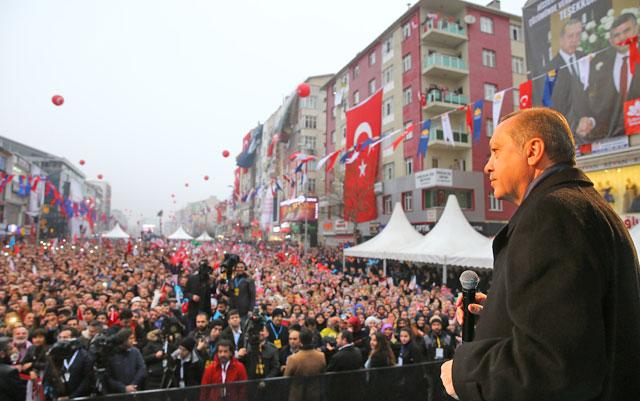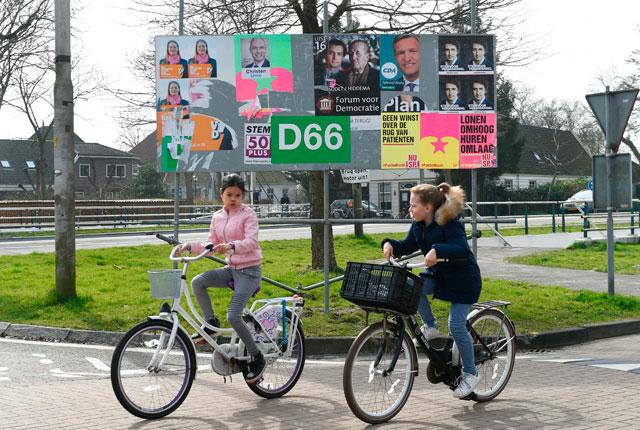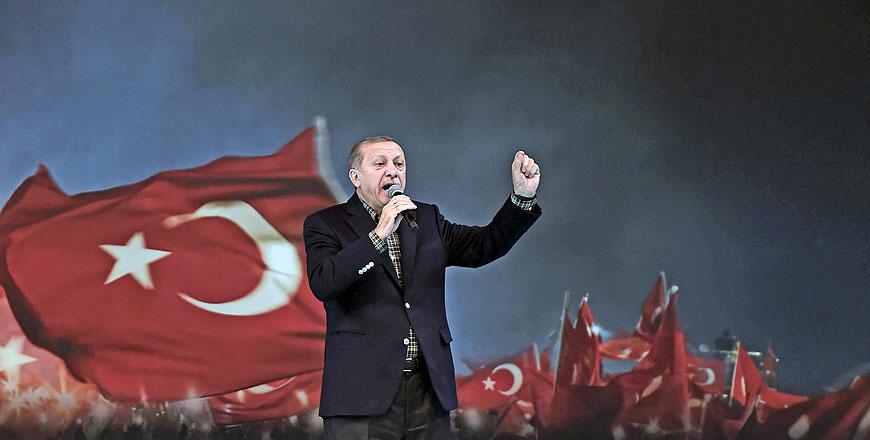You are here
Erdogan compares Dutch rally ban to Nazism as row spirals
By AFP - Mar 11,2017 - Last updated at Mar 11,2017

Turkish President Recep Tayyip Erdogan greets the crowd during a mass opening ceremony at the Sultanbeyli Kent Square in Istanbul, Turkey, on Saturday (Anadolu Agency photo)
ISTANBUL — Turkish President Recep Tayyip Erdogan on Saturday said a Dutch ban on his foreign minister's visit was like Nazism, as tensions rocketed over rallies abroad to help Ankara gain backing for a key vote.
The leader's strongly-worded comments came after The Hague said it would refuse Foreign Minister Mevlut Cavusoglu's plane permission to land for a rally to gather support for a referendum on boosting Erdogan's powers.
The Dutch decision to ban Cavusoglu from visiting and holding a rally in the port city of Rotterdam came after Germany and other European nations also saw moves to block other campaign events.
Unlike in Germany, however, where a string of planned rallies were barred by local authorities, in the Netherlands it was the government that stepped in to block Cavusoglu's visit.
"They are the vestiges of the Nazis, they are fascists," Erdogan told an Istanbul rally on Saturday, days after he angrily compared moves to block rallies in Germany to "Nazi practices".
"Ban our foreign minister from flying however much you like, but from now on let's see how your flights will land in Turkey," Erdogan said.
Turkey promised to avoid the flight ban and send another minister to Rotterdam "by land".
'Crazy' comments
Dutch Prime Minister Mark Rutte said Erdogan's comments were "crazy".
"I understand that they are angry but this is way out of line," he said, adding that it had been a tough decision given Turkey was "a NATO ally".
"I really think we made the right decision here," he said.
The Turkish foreign ministry said it had summoned the Dutch deputy ambassador in protest over the ban.
About 60 people protested outside the Dutch consulate in Istanbul, laying a black wreath and shouting pro-Erdogan slogans such as "Stand tall".
Cavusoglu, speaking in Istanbul, said the ban was "unacceptable.
"Why are you taking sides in the referendum?" he said, adding: "Is the foreign minister of Turkey a terrorist?"
The Dutch government said its decision to bar Cavusoglu from visiting followed a Turkish threat of sanctions.
It was unclear whether the Turkish rally in Rotterdam would still take place. A Rotterdam police spokeswoman told AFP the road where the Turkish consul's house was located had been closed for reasons of "safety".
Turkey's official Anadolu news agency reported that the Turkish family and social policies minister, Fatma Betul Sayan Kaya, would go to Rotterdam "by land" from Duesseldorf in Germany, citing her ministry as a source.
'It will backlash'
The Netherlands is home to some 400,000 people of Turkish origin, and Ankara is keen to harness votes of the diaspora in Europe ahead of the April 16 referendum on creating an executive presidency.
The government in Turkey argues the changes would ensure stability and create more efficient governance but opponents say it would lead to one-man rule and further inflame tensions in its diverse society.
Erdogan accused the Netherlands of working against the "Yes" campaign and said: "Pressure however much you like. Abet terrorists in your country however much you like.
"It will backlash, and there's no doubt that we'll start retaliating after April 16... We are patient. Whoever is patient will reach victory."
Dutch far-right anti-Islam MP Geert Wilders celebrated the government's ban, attributing it to "heavy PVV pressure", in a reference to his party, which appears set to emerge as one of the largest in Dutch parliament in Wednesday's vote.
Allegations of harbouring 'terrorists'
The latest row came after NATO allies Turkey and Germany sparred over the cancellation of a series of referendum campaign events there.
Germany is home to 1.4 million people eligible to vote in Turkey — the fourth-largest electoral base after Istanbul, Ankara and Izmir.
Although Berlin insisted that the string of cancellations by local authorities were down to logistical reasons, Turkish officials repeatedly hit back, leading to Erdogan's angry "Nazi" remark.
German Chancellor Angela Merkel said such rhetoric was "depressing", belittled Holocaust victims and was "so out of place as to be unworthy of serious comment".
Berlin has emerged as a strident critic of Ankara's vast crackdown in the wake of the attempted putsch of last July, which has seen more than 100,000 people arrested, suspended from their jobs or sacked for alleged links to the plotters or to Kurdish militants.
Ankara has in turn accused Berlin of harbouring "terrorists" and failing to respond to requests to hand over suspects from the coup as well as Kurdish militants who it believes are members of the outlawed PKK group.
Related Articles
ISTANBUL — Turkish President Recep Tayyip Erdogan on Sunday warned the Netherlands would pay a price for preventing his ministers from holdi
ISTANBUL — The European Union on Monday warned President Recep Tayyip Erdogan to avoid inflammatory rhetoric, as a diplomatic crisis between
ISTANBUL/ANKARA — President Recep Tayyip Erdogan accused Germany of behaving as in Nazi times in cancelling political meetings of resident T



















